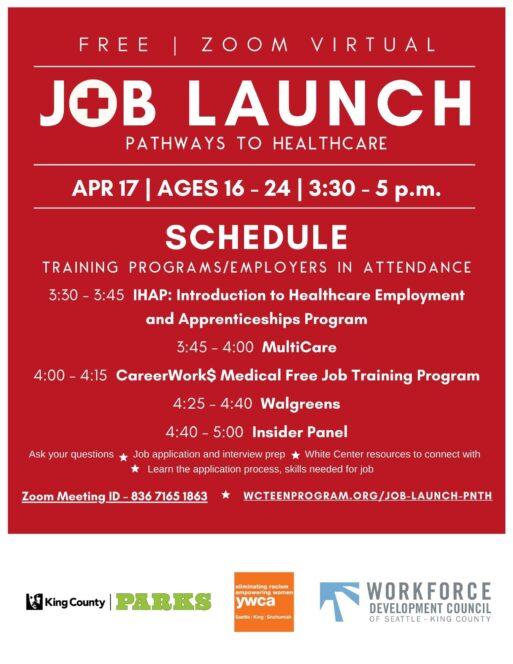By Tracy Record
White Center Now editor
King County Road Services expects to finalize a plan for the 16th Avenue SW street-safety project by the end of August.
That’s what county reps told us after last Wednesday’s meeting at the White Center Food Bank to re-explain the project and listen to community comments. If you weren’t there, you can still voice an opinion via the survey linked here, which will remain open into early August – an attendee asked for a one-week extension, and county reps said OK. At issue is whether or not to include bike lanes in the plan to remove two driving lanes on 16th between 100th and 107th.
The meeting was held by request of the community, and moderated by community advocate Kimnang Seng. First, here’s our video, which is in two parts, starting with the presentation and some Q&A/comments interspersed throughout:
The second part is entirely Q&A and community comments:
Seng explained the reason for the meeting – people felt they hadn’t been adequately heard regarding the project, which was first announced two years ago (here’s our report on the North Highline Unincorporated Area Council meeting where we first learned about it). He said he and others started inquiring about it this past May and learned many felt they didn’t know about it, particularly BIPOC community members, refugees, and merchants. (During the meeting, a WCFB rep said they had contacted Road Services knowing they’d move to this area, and were told the department would get in touch when design was further along, but never did.)
On behalf of King County Local Services, parent department to Road Services, David Daw promised they were trying to fix that, insisting, “We’re here to listen … We are your city hall.”
Road Services director Tricia Davis said the project was rooted in a belief that “this area really needed to be safer for everyone.”
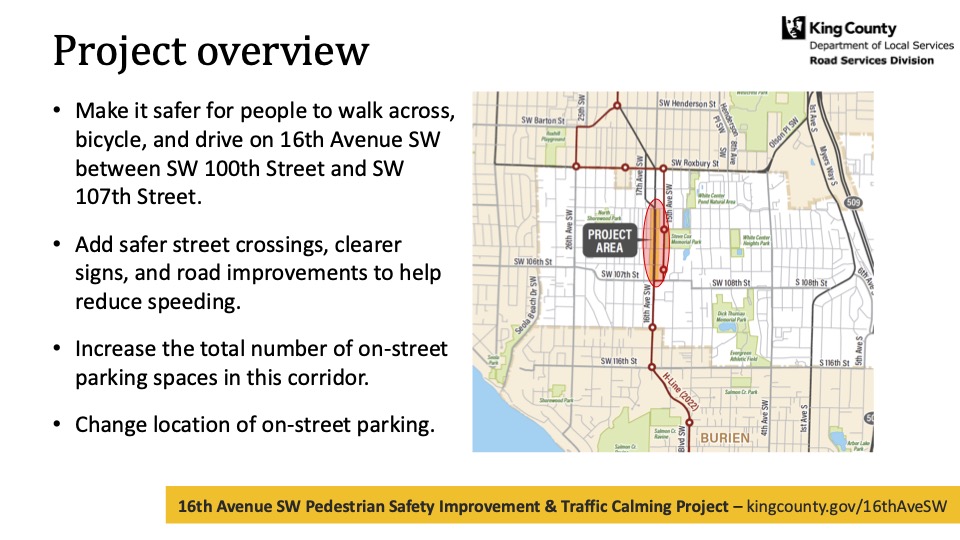
The county received grant money that “narrowed down the options” for how to achieve that, and affected the timeline too – they have to start building this project within a year or they’ll lose the money.
While much attention has been on whether the project includes bicycle lanes or not – Davis said they had decided in favor of them but could reconsider – county traffic engineer Wally Archuleta said the flashing lights and curb bulbs are important parts too. He stressed that the area had a “pretty high” collision rate, which is a major reason this stretch was singled out for changes.
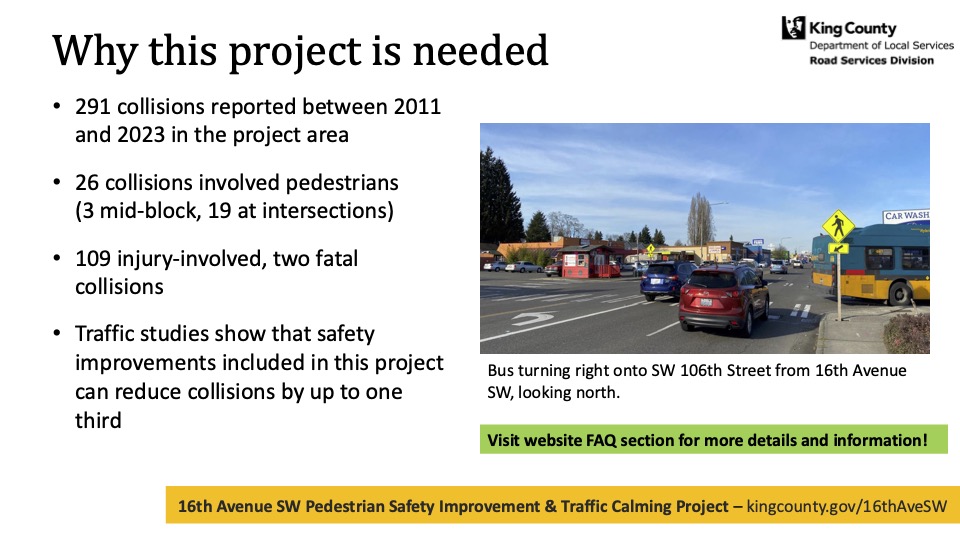
County reps also reiterated that the options would result in more parking spaces than the stretch holds now. Davis said they’re aware how “meaningful” parking is to businesses.
An attendee said she felt the road was already “fantastic” and wondered if Road Services had counted current numbers of pedestrians and bikes, and whether they’d studied the “outcomes” of rechannelization projects on Ambaum in Burien and 35th SW in West Seattle. Overall, she felt the project was just “a federal money grab.” That declaration drew some applause.
Another attendee, after expressing his concern about adequate business parking, wondered how the survey results would be used. Davis clarified that the survey “is not a vote – it’s a gauge of community input … an important piece of data,” though, she added, “so is this conversation.”
To try to allay concerns about parking, they showed the before/after potential views, plus a slide showing how the numbers of parking spaces would change and compare:
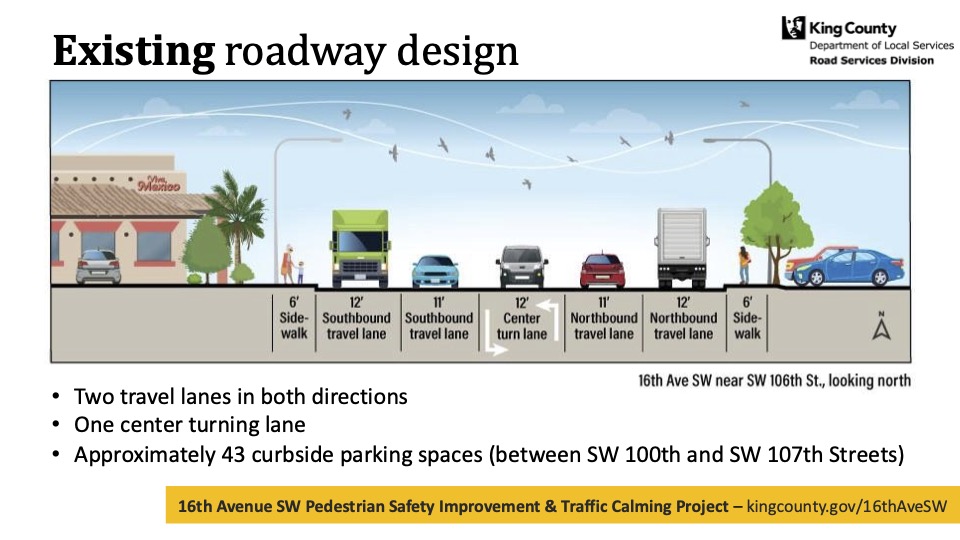
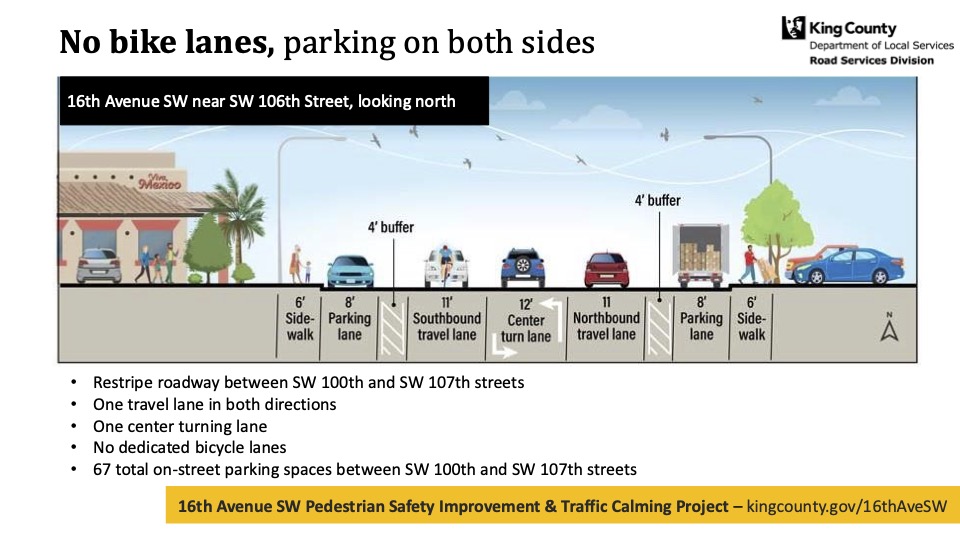
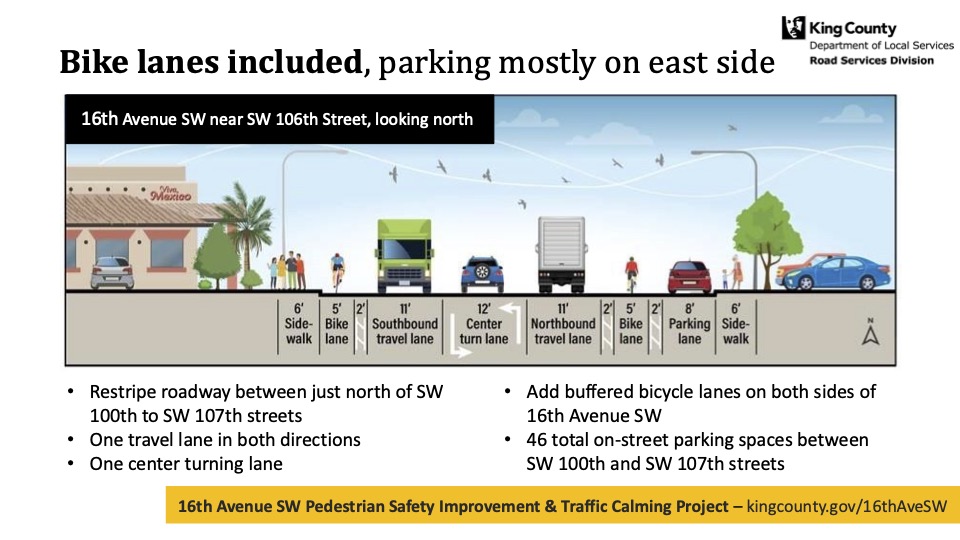
Both options would increase the number of street spaces, the county said, though by a smaller number of added spaces than the design options presented two years ago.
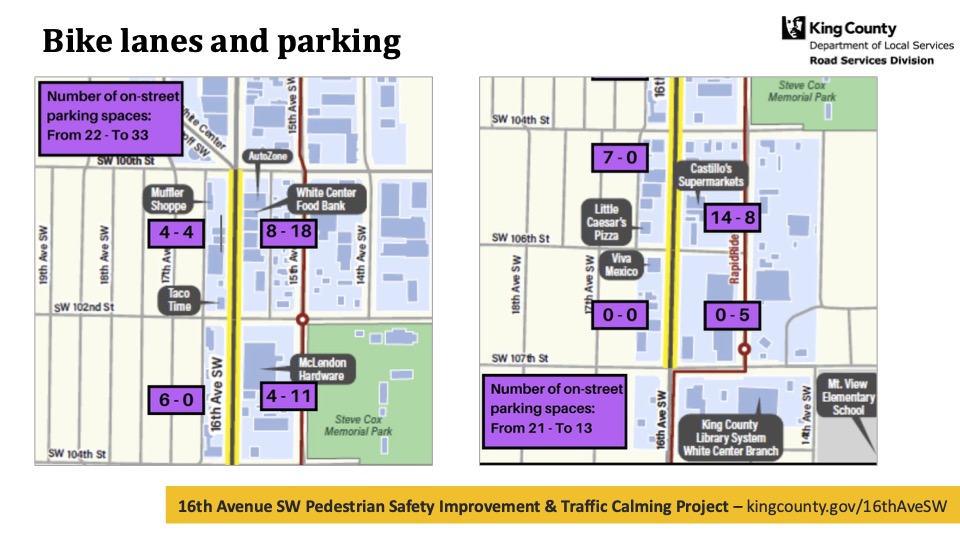
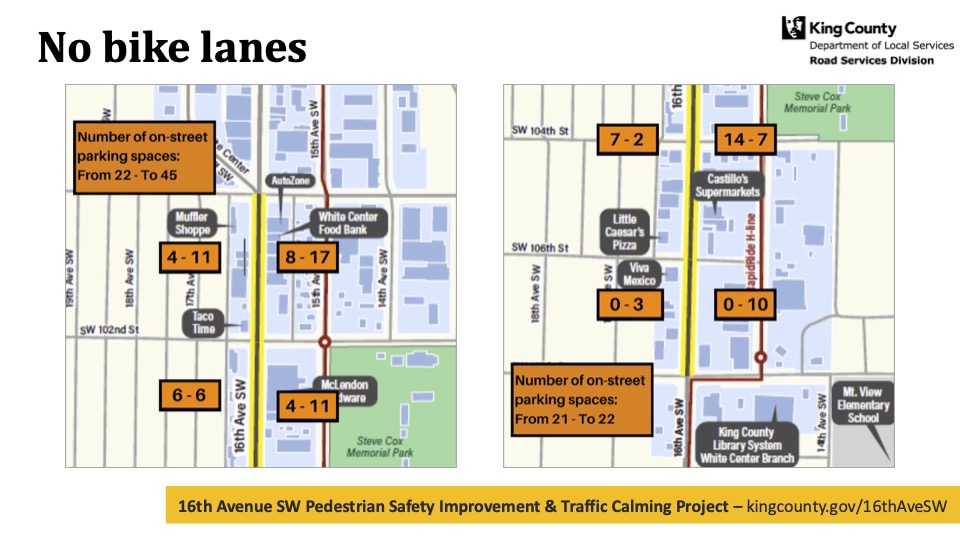
One attendee voiced concern about “a lot of focus on the street parking,” since, he said, he had counted more than 700 offstreet spaces in the area.
White Center bike-shop owner Aaron Goss noted that bike lanes would improve safety for more than the riders: “People who ride bikes make the world safer for everybody.” That drew applause.
Another business owner countered by saying he felt bike lanes would lead to “a lot of people (getting) killed” and observed that “nobody bikes on this road.” He too drew applause.
The county delegation countered by saying that “road diets” cut the number of crashes “almost overnight.”
Another concern they tried to counter was the cost of bike lanes, which they said, if implemented in this project, would cost about $87,000.
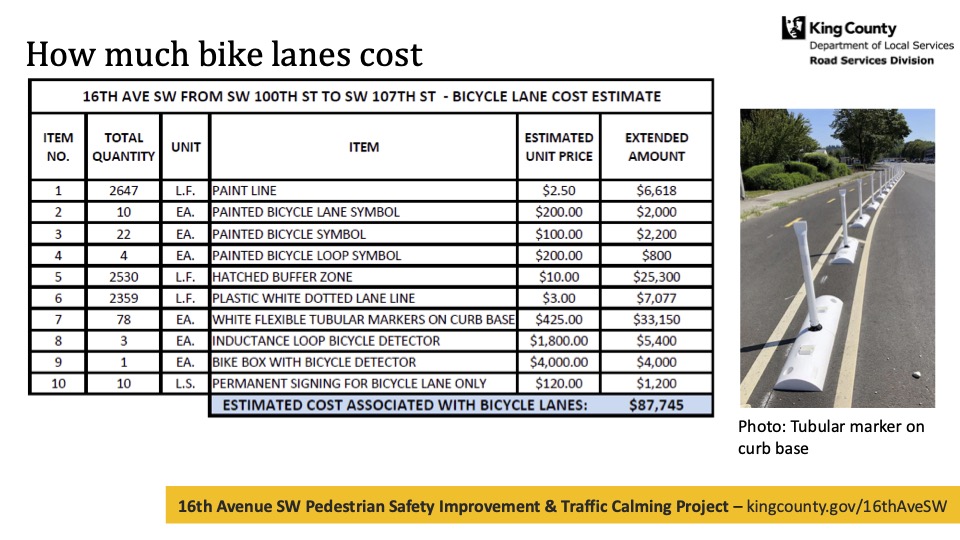
More questions: Did Road Services consult the King County Sheriff’s Office? Archuleta wasn’t sure if they directly reached out to KCSO but said they routinely work with them closely. Did they notice the bike lanes along 16th would not directly connect to others? Davis replied to that by saying that 107th, at the south end of the project zone, is an east-west bike route, that there’s a north-end narrowed street that connects, and that this would be a springboard to growing the bike-lane network – in the “if you build it, they will come” vein.
That didn’t impress the next commenter, who suggested that “lofty goals” are being pursued over “daily life,” and that sidewalks in areas without them would be more useful than driving-lane loss.
Will any trees be planted? another attendee asked. Davis said no. The attendee said that’s bad news for White Center, which has too few trees as it is. But, county reps said, they do now have an urban forester to consult. Also, added Daw, a White Center “beautification survey” starts next month.
A representative of the Khmer community echoed the request for more trees. She also said the previous project survey hadn’t reached her community, and that she feels driving-lane reductions would decrease safety, not improve it.
What about the cultural impat of bike lanes and the dynamics of gentrification? another person asked. Davis said they’re aware gentrification is a concern, but right now “the most important thing they’re thinking about … is safety.” The attendee countered that “economic safety and cultural safety” should be considered too.
What about making 17th a greenway and sending bike traffic there? suggested another participant. Then came a voice in support of bike lanes, someone who moved here seven years ago and gave up riding because it was so unsafe, and would be glad to see this start to move in the other direction: “The neighborhood needs to prioritize all modes of transportation.”
Back to cars – a representative of the Easy Duz It Car Club wondered about the cost of parking, and whether the county had considered the results of a national study on reverse-angle parking. Archuleta said they didn’t have the cost information at hand but would find it and get it out.
Speaking of money, another person asked if money would be available for anyone who had to make changes to offstreet parking or signage because of the eventual plan. Davis affirmed that federal rules might require property owner to pay for “encroachments.”
A question with an unexpected answer: Was reducing the speed limit considered? Archuleta said, “Reducing the speed limit doesn’t make drivers go slower.” The followup: “Is that a data-based statement?” No, he said, “it’s our experience – traffic-calming measures have been (what’s) most effective.”
Those measures will not included added stoplights, he said in response to another question, but there will be more push-button-activated flashing crossing lights. Will timing be improved for existing signals? Archuleta said timing is an “ongoing” matter, so if there’s a particular signal that you think should be examined, report it.
In conclusion, Davis promised her team would “continue to listen (and) read survey results,” and she promised those would be shown to the community. Granting a request to extend the survey would mean it’s open until August 7; you can take it here. But, she warned, “it’s late in the process … (we) need to make a decision and move forward pretty quickly.”

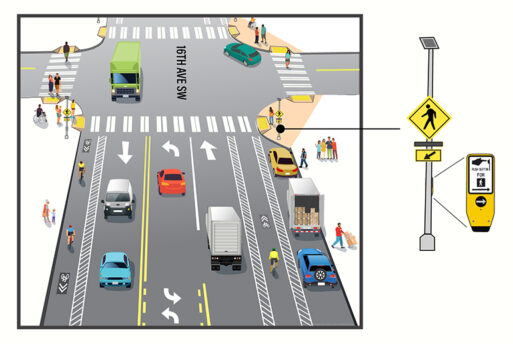
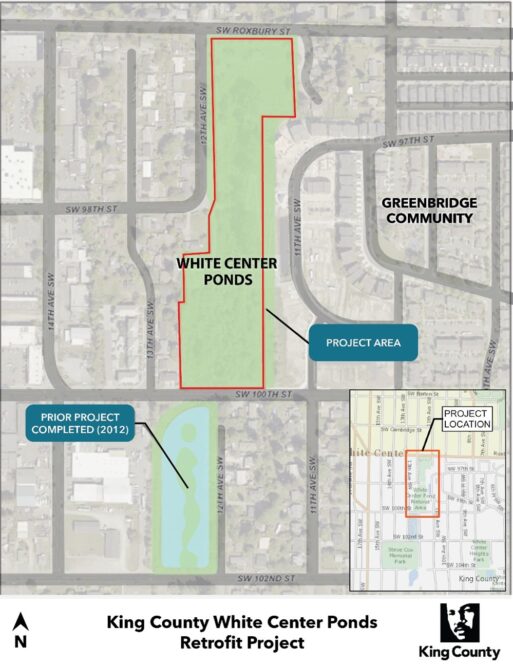
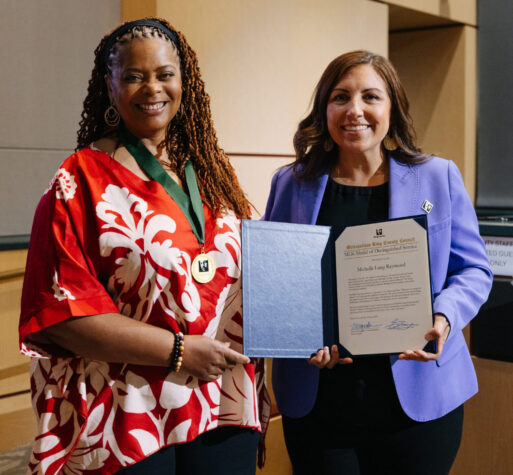
 The King County Council on Tuesday voted to appoint De’Sean Quinn to fill the District 5 council seat vacated when Dave Upthegrove was elected as Washington State Lands Commissioner.
The King County Council on Tuesday voted to appoint De’Sean Quinn to fill the District 5 council seat vacated when Dave Upthegrove was elected as Washington State Lands Commissioner.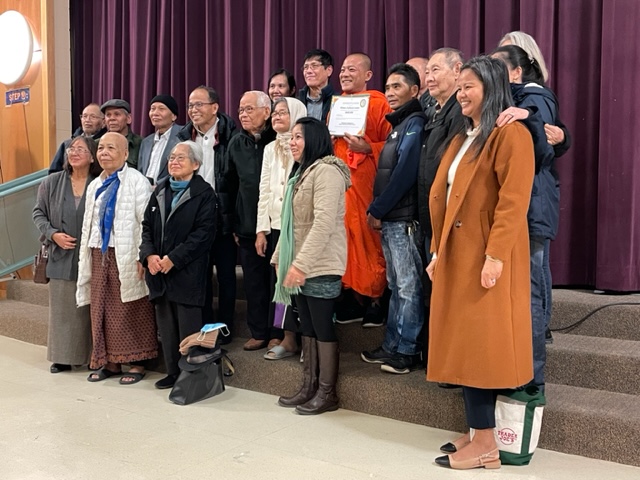








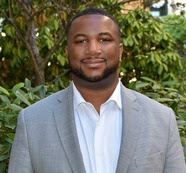 Leon Richardson has been appointed the new director of King County’s Department of Local Services. He was previously at the County Department of Community and Human Services, where his achievements include helping stand up vital assessment and recovery centers at the start of the COVID-19 pandemic. In a matter of weeks, he built out King County’s vaccination infrastructure, ensuring equitable access and distribution. Additionally, he administered a $400 million eviction and rent assistance program as well as overseeing the renewal of the Veterans, Seniors, and Human Services Levy.
Leon Richardson has been appointed the new director of King County’s Department of Local Services. He was previously at the County Department of Community and Human Services, where his achievements include helping stand up vital assessment and recovery centers at the start of the COVID-19 pandemic. In a matter of weeks, he built out King County’s vaccination infrastructure, ensuring equitable access and distribution. Additionally, he administered a $400 million eviction and rent assistance program as well as overseeing the renewal of the Veterans, Seniors, and Human Services Levy.